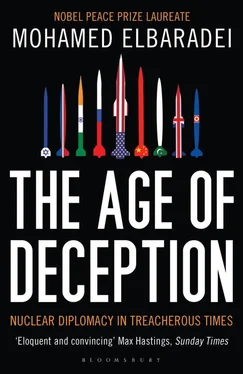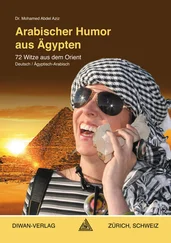Predictably, the Jerusalem Post took the attack one step further, with quotes such as “ElBaradei is a man of dubious integrity” and “ElBaradei has been Iran’s primary international defender” and even “ElBaradei has used his power to facilitate the proliferation of nuclear energy for military purposes.” [14] Caroline Glick, “ElBaradei’s Nuclear Policy,” Jerusalem Post, August 27, 2007.
A columnist in Al-Hayat, one of the leading newspapers in the Arab world, charged that I was acting in defiance of the Security Council resolutions, trying to give Iran a way to avoid additional sanctions and perfect its technology. Even the New York Times took a shot, in a lengthy profile that portrayed me as somewhere between “everyone’s best hope” and “drunk with the power of [the] Nobel.” [15] Elaine Sciolino and William J. Broad, “An Indispensable Irritant to Iran and Its Foes,” New York Times, September 17, 2007.
One journalist thought that the Times article had characterized me as a “dictatorial loon.” [16] Katrina vanden Heuvel, “Proponent of Diplomatic Solution for Iran Smeared by White House,” Nation. Reprinted in “Bush, the Bomb, and Iran,” CBS News Opinion , September 25, 2007.
In Vienna, the Americans reportedly gave their irritation more concrete expression. Abdul Minty, the South African ambassador, said he had heard from a journalist that the Americans were planning to orchestrate a campaign with the Board for a vote of no confidence in me for exceeding my mandate. The journalist had in his notes the names of twenty countries the Americans had targeted to lobby for their support. I was told that the media had received this information from Chris Ford, the U.S. deputy assistant secretary of state for arms control. In any case, after the rumor reached the Associated Press, [17] “IAEA Chief ElBaradei Being Pressured on Iran—Diplomats,” Associated Press, September 9, 2007.
the U.S. Mission publicly denied that any such campaign was under way.
There was a great deal of irony to these attacks. It was not new for me to be castigated for speaking or acting beyond my brief. On most such previous occasions, the accusation came in response to my calls for more rapid progress on disarmament or my comments on the limited value of Security Council sanctions as a stand-alone diplomatic strategy. This time I was accused of freelancing for attempting to implement the IAEA’s core verification mission. As early as August we were able to report progress to the Board due to the work plan: a number of nuclear verification issues had been resolved, because Iran had provided long-sought information. But this success was condemned. The truth was that the Americans wanted only to portray Iran as a noncooperative pariah state, in violation of its international obligations and therefore deserving continued punishment. My reports were getting in the way of the Americans’ preferred course of action.
For anyone who cared to see, the cards were now on the table. The hard-liners in the West were not concerned with clearing up these outstanding issues. Their focus was denying Iran technology through isolation, confrontational rhetoric, and ideological games. That might have been their business, but it was not mine. And I would not stand idly by while extremists planted the seeds for another devastating war in the Middle East.
The willingness of the press to be manipulated was particularly worrisome. Some of the key phrases used to criticize the Agency were repeated in the mainstream U.S. media, making me wonder whether the American government was behind an orchestrated campaign. I was reminded of the period leading up to the Iraq War. I found it interesting that, in all the analysis, there was not one substantive refutation of the policies or steps I had endorsed. The arguments were focused on casting doubt on my character and motivations.
I hit back. I gave several interviews making it clear that the IAEA had not seen any undeclared facilities in Iran nor any weaponization activities. Therefore, I said, in our assessment Iran did not constitute a clear and present danger requiring any kind of action beyond diplomacy. What was needed across the Middle East was more “soft power”: education, intercultural dialogue, good governance, and development. Any use of force, I declared, would turn the Middle East into a ball of fire.
Negotiations with the P-5+1, meanwhile, were going nowhere. Despite Larijani’s efforts to get back to “prenegotiations,” Solana was blocked by the Americans from continuing. He told Larijani they could meet after the work plan was completed. On the other hand, the Russians and the Chinese told the other members of the P-5+1 that they would not support another set of sanctions. So the only game in town, for the moment, was the IAEA’s work with the Iranians on the outstanding issues.
During the September Board meeting, I had an advance view of the EU-3’s planned statement. It was quite negative. It omitted, pointedly, the customary expression of support for the Agency and its Director General as impartial and professional. I knew the French had been trying to delete this phrase for the last couple of Board meetings. This time they had managed to do it. I decided the best response was to walk out during the delivery of their speech, which I did. My seemingly simple act was widely reported in the media. The effect was to send a message to the rest of the Europeans that they should resist being lured into imprudent behavior by one or two countries inside the European Union, in this case, France. [18] In fact, it was not uncommon for me to hear other members of the European Union express private resentment of the “big three”—France, the United Kingdom, and Germany—and particularly the first two. The other European countries seldom felt they were genuinely consulted on what were nonetheless characterized as joint political stances on Iran. In particular, some viewed the United Kingdom as a sort of U.S. Trojan horse inside the European Union.
Bernard Kouchner, the new French foreign minister, declared in an interview about Iran on RTL Radio that “We have to prepare for the worst, and the worst is war.” His interview occurred just as the IAEA was beginning its annual General Conference. I responded publicly with a reminder that, under international law, there were rules governing the use of military force, including authorization by the Security Council. Many politicians, including the Germans and the Russians, reacted strongly to Kouchner’s statement, and he took hasty action to retract what he had said. [19] Katrin Bennhold and Elaine Sciolino, “After Talk of War, Cooler Words in France on Iran,” New York Times , September 17, 2007.
After all the commotion over the work plan, in late September the P-5+1 endorsed it, urging Iran “to produce tangible results rapidly and effectively by clarifying all outstanding issues and concerns.” The Chinese and the Russians had already made clear their support for the plan. I was told that the EU-3 had cautioned the United States that attacking the Agency was counterproductive and could backfire.
For whatever reason, the Americans abruptly reversed their hostile position. Only one week earlier, Condoleezza Rice had taken a swipe at the Agency and, by implication, me. [20] Sue Pleming, “Rice Swipes at IAEA, Urges Bold Action on Iran,” Reuters, September 17, 2007.
“The IAEA is not in the business of diplomacy,” she declared. “The IAEA is a technical agency that has a board of governors of which the United States is a member.” Now, in quite a diplomatic about-face, Nicholas Burns, undersecretary of state for political affairs, when asked about U.S. criticism of the plan, implied that the Americans had supported it all along.
Читать дальше












